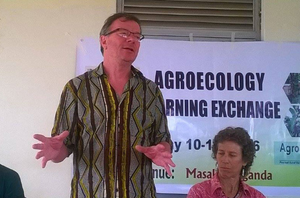Organizations that are advocating for agroecology farming practices among small holder farmers in Uganda and Africa at large have urged Uganda government and policy makers to support small farmers in terms of finances and knowledge to increase food production for their families and income earning, instead of opening Uganda to genetically modified organisms (GMOs).
Speaking at the closure of 4 days conference held at Masaka St Jude Agro ecology center to propose agroecological solutions to world hunger, rural poverty and environmental degradation, Henk Hobbelink, coordinator, GRAIN, an international agroecology organization based in Barcelona, Spain, noted that adopting genetically modified organisms will not increase food.
‘’As international agricultural experts, we find it troubling that Uganda, a country which is fourth in the production of organic foods in the world and first in Africa, wants now to opt for GMO’’ Hobbelink told the press.
He added that GMOs are not for human consumption in countries that use them such as United States.
The four-day conference attracted leaders from global agroecology movement to share knowledge and experience and debate strategies to feed the world through health and sustainable food system based in agroecology.
Meanwhile, 3,000 cotton farmers in Maharashtra and Punjab states in India have so far committed suicide for the last few years after planting BT cotton, a genetically modified that failed to market.
Neha Raj Singh, project coordinator and research analyst, at Navdanya farmers’ movement, told the same gathering that more farmers acquired huge loans to plant cotton and failed to repay.
On the same concern, Bridget Mugambe, the policy advocate at Alliance for food sovereignty in Africa noted that the task that the 10th parliament should begin with is to pull out the Biosafety and Biotechnology bill from parliament because it seeks to facilitate GMOs rather than regulating.
She said the “biosafety” aspects in the bill are lacking which is a key tenet of any national bio safety regulatory system intended to assess the safety of GMOs to humans and environment. This is a fundamental disconnect between the title and content of the bill.
Source: Capital Radio, Uganda
